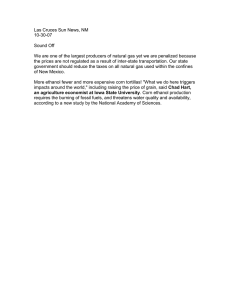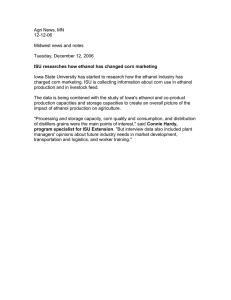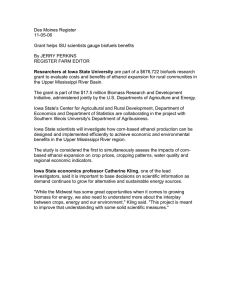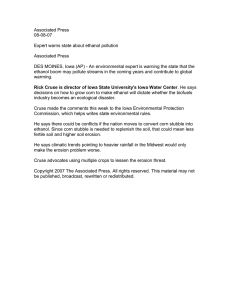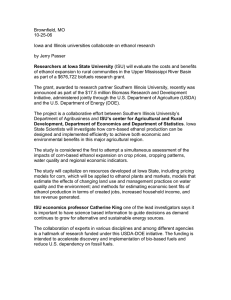Des Moines Register 05-31-06 Demand for ethanol puts business back on tracks
advertisement
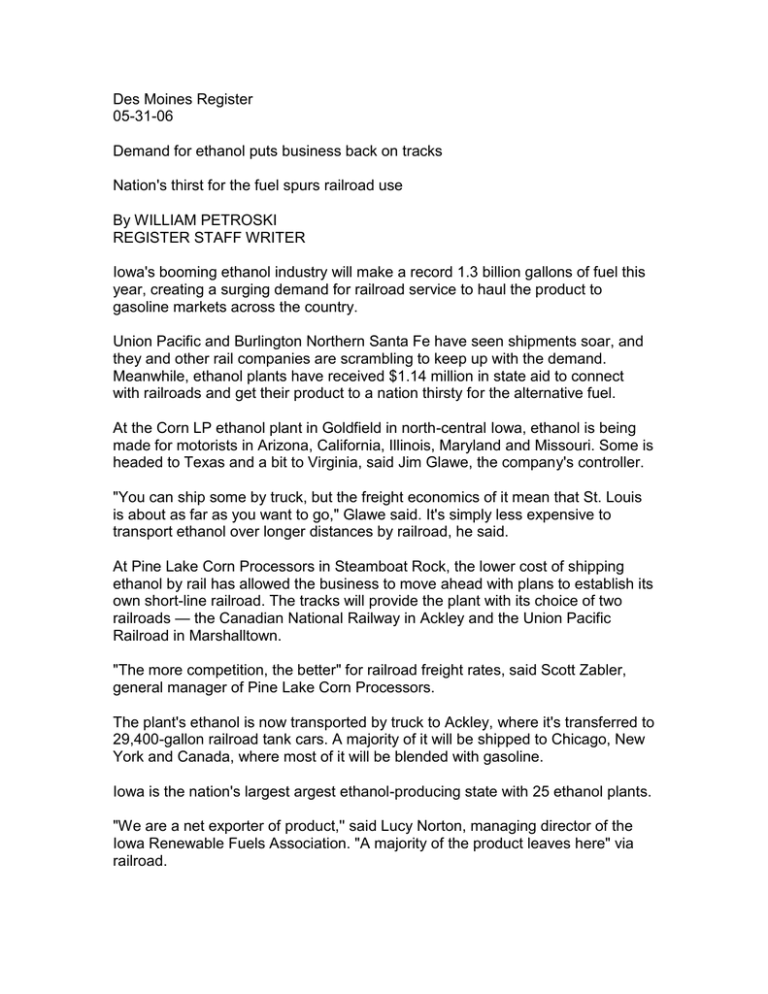
Des Moines Register 05-31-06 Demand for ethanol puts business back on tracks Nation's thirst for the fuel spurs railroad use By WILLIAM PETROSKI REGISTER STAFF WRITER Iowa's booming ethanol industry will make a record 1.3 billion gallons of fuel this year, creating a surging demand for railroad service to haul the product to gasoline markets across the country. Union Pacific and Burlington Northern Santa Fe have seen shipments soar, and they and other rail companies are scrambling to keep up with the demand. Meanwhile, ethanol plants have received $1.14 million in state aid to connect with railroads and get their product to a nation thirsty for the alternative fuel. At the Corn LP ethanol plant in Goldfield in north-central Iowa, ethanol is being made for motorists in Arizona, California, Illinois, Maryland and Missouri. Some is headed to Texas and a bit to Virginia, said Jim Glawe, the company's controller. "You can ship some by truck, but the freight economics of it mean that St. Louis is about as far as you want to go," Glawe said. It's simply less expensive to transport ethanol over longer distances by railroad, he said. At Pine Lake Corn Processors in Steamboat Rock, the lower cost of shipping ethanol by rail has allowed the business to move ahead with plans to establish its own short-line railroad. The tracks will provide the plant with its choice of two railroads — the Canadian National Railway in Ackley and the Union Pacific Railroad in Marshalltown. "The more competition, the better" for railroad freight rates, said Scott Zabler, general manager of Pine Lake Corn Processors. The plant's ethanol is now transported by truck to Ackley, where it's transferred to 29,400-gallon railroad tank cars. A majority of it will be shipped to Chicago, New York and Canada, where most of it will be blended with gasoline. Iowa is the nation's largest argest ethanol-producing state with 25 ethanol plants. "We are a net exporter of product,'' said Lucy Norton, managing director of the Iowa Renewable Fuels Association. "A majority of the product leaves here" via railroad. By year's end, Iowa will also have six biodiesel plants operating that will produce 120 million gallons annually. While gasoline can be efficiently transported to Iowa via underground pipelines, ethanol is different, industry officials said. Ethanol is a solvent that cleans out impurities in a pipeline, meaning ethanol transported by pipeline won't remain a gasoline-quality product, said Norm Olson, manager of Iowa State University's biomass energy conversion facility in Nevada. In addition, most Iowa ethanol plants aren't along pipelines, and ethanol is being shipped to many states that don't have direct pipeline connections to Iowa, industry officials said. The Iowa Department of Transportation has been providing financial assistance to help new ethanol plants construct rail spurs that will provide connections to railroad lines. Five Iowa ethanol plants have received a total of $485,000 in state grants, while two other ethanol plants have been provided state loans totaling $650,000. "Rail is a very integral part of the delivery of ethanol currently to the East and West coasts, and potentially down to Texas" and other states, said Larry Mesenbrink, Iowa Department of Transportation rail development manager. The situation is complicated, though, because the big increase in ethanol railroad shipments is occurring at the same time manufacturers in other industries are expanding their use of rail freight service, he said. "It's really accelerated within the last eight to 10 months with fuel prices going up," Mesenbrink said. He noted that Iowa grain elevators have had shortages of railroad hopper cars to haul grain, raising issues of whether similar problems could happen with railroad tank cars that transport ethanol. Officials with the Union Pacific, the nation's largest railroad, and the Burlington Northern Santa Fe said they are working to accommodate the ethanol industry. "I can tell you that ethanol is an ever-increasing commodity group for us," said Mark Davis, a Union Pacific spokesman in Omaha. A Union Pacific official was quoted by a trade journal last year as saying the railroad expects to transport 2.8 billion gallons of ethanol annually by 2008, nearly doubling its ethanol shipments. The company is helping to speed the flow of ethanol by investing in track projects near several Midwest ethanol plants, Davis said. Burlington Northern Santa Fe transported 37,100 tank cars of ethanol systemwide in 2005, about four times as much as in 2000, said spokeswoman Suann Lundsberg in Fort Worth, Texas. The company's "Ethanol Express" program was developed in response to California's switch from the gasoline additive MTBE to ethanol. The idea is to have 95-car unit trains hauling the product to Southern California with a rapid return of empty tank cars to Midwest ethanol producers. "We will guarantee transit times, and it is a way to effectively manage inventory levels," Lundsberg said. For now, virtually all of the corn used to produce ethanol is trucked into the Iowa plants, a benefit of being in the Corn Belt, said Walt Wendland, president of the Golden Grain Energy in Mason City. There's been speculation that Iowa could need to import corn from out-of-state sometime if the industry continues to grow at a rapid pace. One of the biggest projects is planned by Archer Daniels Midland, which has announced it will expand ethanol production at its Cedar Rapids' complex by 275 million gallons annually. But Norton of the Iowa Renewable Fuels Association said any importation of corn in Iowa for ethanol production is unlikely happen anytime soon. "You know, typically corn growers have always stepped up when there is a demand for their product," she said.

